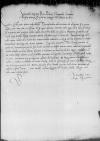Expendentibus nobis in animo nostro diligenter, quam in periculosissimo statu nunc sint res Christianae et quam ingens discrimen immineat nobis, Poland (Kingdom of Poland, Polonia)⌊regno nostroPoland (Kingdom of Poland, Polonia)⌋ et Royal Prussia (Prussia Regalis), region, part of Prussia annexed to the Kingdom of Poland in 1466 under the provisions of the Second Peace of Thorn⌊terris nostris PrussiaeRoyal Prussia (Prussia Regalis), region, part of Prussia annexed to the Kingdom of Poland in 1466 under the provisions of the Second Peace of Thorn⌋, cum paries nobis proximus ardet, ardent enim omnia bello, nec solum in Hungary (Kingdom of Hungary)⌊HungariaHungary (Kingdom of Hungary)⌋ et Austria⌊AustriaAustria⌋, sed in aliis quoque dominiis hostisque communis nominis Christiani quasi in limine est, operae pretium ergo est nobis unacum subditis nostris malum hoc maturo consilio antevertere rebusque nostris ita prospicere, ut nos ipsos, Poland (Kingdom of Poland, Polonia)⌊rempublicamPoland (Kingdom of Poland, Polonia)⌋ dominiaque nostra servare possemus. Atque ideo conventum Royal Prussia (Prussia Regalis), region, part of Prussia annexed to the Kingdom of Poland in 1466 under the provisions of the Second Peace of Thorn⌊terris PrussiaeRoyal Prussia (Prussia Regalis), region, part of Prussia annexed to the Kingdom of Poland in 1466 under the provisions of the Second Peace of Thorn⌋ generalem in Marienburg (Malbork), town and castle in northern Poland, Pomeranian Voivodeship, on the Nogat river, a branch of the Vistula at its delta, the capital of the Grand Masters of the Teutonic Order in Prussia (1309-1457), a voivodeship capital in Royal Prussia, which belonged to the Kingdom of Poland (1466-1772). Marienburg (taking turns with Graudenz (Grudziądz)) was the venue for the Provincial Diets of Royal Prussia, which were chaired by the bishop of Ermland (Warmia)⌊oppido nostro MariemburgensiMarienburg (Malbork), town and castle in northern Poland, Pomeranian Voivodeship, on the Nogat river, a branch of the Vistula at its delta, the capital of the Grand Masters of the Teutonic Order in Prussia (1309-1457), a voivodeship capital in Royal Prussia, which belonged to the Kingdom of Poland (1466-1772). Marienburg (taking turns with Graudenz (Grudziądz)) was the venue for the Provincial Diets of Royal Prussia, which were chaired by the bishop of Ermland (Warmia)⌋ pro 1532-09-29⌊die festo sancti Michaelis archangeli proxime venturo1532-09-29⌋ indicendum et statuendum omnibus ordinibus terrarum illarum duximus et indicimus ac statuimus praesentibus. Quare mandamus S(trenuita)ti or S(incerita)ti⌈S(trenuita)tiS(trenuita)ti or S(incerita)ti⌉
Tuae, omnino habere volentes, ut ad praedictum conventum ad oppidum Marienburg (Malbork), town and castle in northern Poland, Pomeranian Voivodeship, on the Nogat river, a branch of the Vistula at its delta, the capital of the Grand Masters of the Teutonic Order in Prussia (1309-1457), a voivodeship capital in Royal Prussia, which belonged to the Kingdom of Poland (1466-1772). Marienburg (taking turns with Graudenz (Grudziądz)) was the venue for the Provincial Diets of Royal Prussia, which were chaired by the bishop of Ermland (Warmia)⌊MariemburgMarienburg (Malbork), town and castle in northern Poland, Pomeranian Voivodeship, on the Nogat river, a branch of the Vistula at its delta, the capital of the Grand Masters of the Teutonic Order in Prussia (1309-1457), a voivodeship capital in Royal Prussia, which belonged to the Kingdom of Poland (1466-1772). Marienburg (taking turns with Graudenz (Grudziądz)) was the venue for the Provincial Diets of Royal Prussia, which were chaired by the bishop of Ermland (Warmia)⌋ pro 1532-09-29⌊festo sancti Michaelis1532-09-29⌋ veniat, auditura ea, quae per nuntium nostrum declarabuntur de hisque una cum aliis consiliariis nostris et statibus ac ordinibus Royal Prussia (Prussia Regalis), region, part of Prussia annexed to the Kingdom of Poland in 1466 under the provisions of the Second Peace of Thorn⌊terrarum PrussiaeRoyal Prussia (Prussia Regalis), region, part of Prussia annexed to the Kingdom of Poland in 1466 under the provisions of the Second Peace of Thorn⌋ studiosius efficaciusque quam antea consultura aliterque non factura pro gratia nostra.


 BCz, 1601, p. 264
BCz, 1601, p. 264